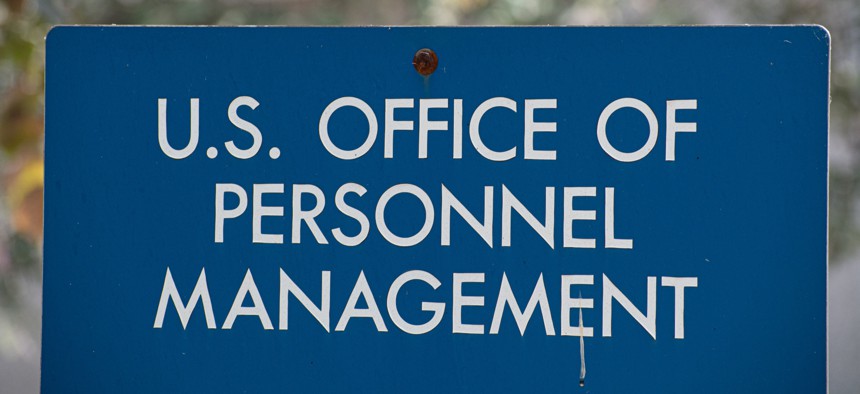
OPM's essay questionnaire, which will be required as part of the hiring process for most federal positions, queries job applicants on their patriotism, “commitment to the Constitution” and the country’s “founding principles.” Douglas Rissing / Getty Images
OPM ‘merit’ hiring plan includes bipartisan reforms, politicized new test
The federal government’s HR agency on Thursday instructed agencies to cease collecting data on the demographic makeup of their workforces.
Federal job applicants will soon be quizzed on their favorite Trump administration policy as part of the hiring process, according to the Office of Personnel Management’s new “merit hiring plan.”
“How would you help advance the president’s executive orders and policy priorities in this role?” asks one of four essay questions that job seekers must answer if they are seeking any federal position GS-5 or above. “Identify one or two relevant executive orders or policy initiatives that are significant to you, and explain how you would help implement them if hired.”
The federal government’s dedicated HR agency published the plan via a joint memo from Vince Haley, director of President Trump’s Domestic Policy Council and acting OPM Director Charles Ezell. The document is a hodgepodge of bipartisan reforms developed under both Trump and former President Biden to accelerate and improve the hiring process, alongside plans to eradicate longstanding efforts to make the federal workforce more reflective of the American populace.
“The American people deserve a federal workforce dedicated to American values and efficient service,” they wrote. “Yet, federal hiring criteria long ago abandoned any serious need for technical skills and adherence to the Constitution. Instead, the overly complex federal hiring system overemphasized discriminatory ‘equity’ quotas and too often resulted in the hiring of unfit, unskilled, bureaucrats.”
The plan calls on agencies to end any use of “racial quotas and preferences” in the federal hiring process, including usage of demographic statistics in hiring, recruiting, retention and promotion decisions. And it requires agencies to cease collecting and disseminating statistics “regarding the composition of the agency’s workforce based on race, sex, color, religion or national origin.”
As part of the plan, OPM said it will expand its recruiting efforts particularly at religious colleges and universities, homeschooling and other faith-based groups, an apparently conservative spin on the Biden administration’s efforts to step up recruitment at historically black colleges and universities.
The aforementioned essay questionnaire, which will be required as part of the hiring process for most federal positions, also queries job applicants on their patriotism, “commitment to the Constitution” and the country’s “founding principles,” how they would improve government efficiency and about their overall work ethic.
Amidst these plans are efforts to advance bipartisan reforms to improve the pace and quality of the hiring process, including advancing skills-based hiring initiatives, shared certifications so that multiple agencies can hire from the same pool of applicants and shaving the length federal resume down to better reflect the hiring process in the private sector.
But one federal HR official said that taken together, this plan will make life harder for hiring managers and applicants alike.
“Everything in it will make it more difficult to hire, not less,” they said. “How the f--- do you define if someone is patriotic?”
The plan also calls on agencies to immediately cease allowing applicants to self-assess their skills and qualifications. But while that system has received criticism because it tends to incentivize job seekers to overstate their experience, an HR official said it still serves a critical purpose of sorting applications on the front-end of the process.
“If we don’t have them self-identifying what their skills are, then we have to go through and, instead of them answering the questions, we have to decide what their answer would have been and what their score should be,” they said. “We have to come through and individually make a paper matrix for each and every applicant and put the competencies they’re rated on, and then send that, along with all of the application packages, to a panel of two to three [subject matter experts], who have to go through and assign scores based on competencies. And then they have to get their s--- together, fill all that out and send it back to us, and then we have to manually put them into scores, to put them into a category, before we can create a certification. It’s f------ insane.”
Don Kettl, professor emeritus at the University of Maryland and former dean of its School of Public Policy, said that in the administration’s fervor to excise all things diversity, equity and inclusion from the hiring process, it failed to connect its process improvements to agency mission outcomes.
“I expected to find some linkage between hiring on one side and mission on the other, but there’s nothing in this about mission, and the one thing we know is we have a system where the process is out of sync with the mission,” he said. “To take what is clearly one of the most important efforts to look at the hiring process, and then to miss the single most important issue that needs to be solved, is a major missed opportunity.”
And the decision to cease data collection and monitoring of the demographic makeup of the federal workforce will hurt both those who study government and agency decisionmakers themselves, he said.
“I’m concerned about it, not because it would make it harder to pursue DEI goals as a matter of policy, but that in general, it’s important not to throw out information about what it is that you’re doing,” Kettl said. “It would be important to know whether or not you’re hiring 90% men for certain occupations . . . You don’t want to blind yourself to the implications of what you’re doing.”
How are these changes affecting you? Share your experience with us:
Erich Wagner: ewagner@govexec.com; Signal: ewagner.47
NEXT STORY: Fired GSA 18F employees appeal to have jobs reinstated







